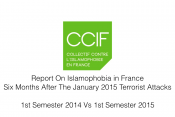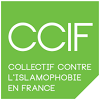A new report by Le Collectif Contre l’Islamophobie en France (CCIF) documents the intensification of violence against Muslims following the Paris attacks in January 2015.
After the terrorist attacks earlier this year in France – in which eleven staff at the magazine Charlie Hebdo were gunned down, a police officer outside was killed, another police officer killed the next day and, after that, four Jewish people killed in a Kosher supermarket siege – what followed was an escalation of anti-Muslim violence. Grenades were thrown at a mosque in Paris just hours after the first murders took place. Explosions rocked a kebab shop near a mosque in Villefranche-sur-Saone; a Muslim family in Vaucluse managed to escape in their car after coming under fire; shots were fired in the direction of a Muslim prayer hall near Narbonne. These attacks continued in the months that followed, in the form of threats, assaults and campaigns of serious violence. But whilst these attacks intensified following the immediate aftermath, mainstream concern or interest in them did not follow suit. Over time, this escalation of violence barely punctured France’s complacency. And it is for this reason that the ‘Report on Islamophobia in France six months after the January 2015 terrorist attacks’, published earlier this month by CCIF, is important.
 Set up in 2003, CCIF reports on, analyses and disseminates information about Islamophobia in France, whilst working collectively with anti-racist groups across Europe. The collective also offers legal advice and psychological support to victims of Islamophobia. Its most recent report draws on statistics drawn from its own case-load, and it compares anti-Muslim incidents – from racist attacks to discrimination at work and in schools – from the first six months of 2015 with the same time-frame last year. It is short and it is to the point.
Set up in 2003, CCIF reports on, analyses and disseminates information about Islamophobia in France, whilst working collectively with anti-racist groups across Europe. The collective also offers legal advice and psychological support to victims of Islamophobia. Its most recent report draws on statistics drawn from its own case-load, and it compares anti-Muslim incidents – from racist attacks to discrimination at work and in schools – from the first six months of 2015 with the same time-frame last year. It is short and it is to the point.
Beyond a ‘backlash’
Four hundred and eighty-nine ‘Islamophobic acts’ were reported to CCIF in the first six months of 2015, compared to 396 in the same period in 2014. Physical assaults increased by 500 per cent, verbal incidents by 100 per cent, attacks on mosques by 400 per cent. In both years, ‘discriminations’ – by public and private bodies – were the most frequent type of incident.
 CCIF is only one small organisation. The incidents reported to it are just a snapshot of a wider picture of violence. But the report outlines the ferocity of the physical backlash to the January 2015 attacks, frequently, as CCIF explains, targeting women and girls. It is a backlash measured by way of death threats, assaults and ‘declarations of war against Muslims whom are portrayed as a fifth column’. And yet if terms like ‘backlash’, ‘revenge’ or ‘retaliation’ describe the immediacy of the anti-Muslim violence that has escalated in France, they offer only a partial descriptor of the more deep-rooted issues at stake. They isolate events from their context. They highlight the present, but they erase history. ‘It is obvious’, the report points out, that acts reported to it cannot be understood without further understanding ‘the steady … rise of Islamophobia in France for the past fifteen years, coupled with authorities’ inability – if not refusal – to take firm and concrete steps to fight it’. Those who come to CCIF for support, the report explains, rarely press charges. And the reasons that people give for this are clear: ‘Agents refuse to take my complaint’, and ‘Perpetrators are rarely convicted…’
CCIF is only one small organisation. The incidents reported to it are just a snapshot of a wider picture of violence. But the report outlines the ferocity of the physical backlash to the January 2015 attacks, frequently, as CCIF explains, targeting women and girls. It is a backlash measured by way of death threats, assaults and ‘declarations of war against Muslims whom are portrayed as a fifth column’. And yet if terms like ‘backlash’, ‘revenge’ or ‘retaliation’ describe the immediacy of the anti-Muslim violence that has escalated in France, they offer only a partial descriptor of the more deep-rooted issues at stake. They isolate events from their context. They highlight the present, but they erase history. ‘It is obvious’, the report points out, that acts reported to it cannot be understood without further understanding ‘the steady … rise of Islamophobia in France for the past fifteen years, coupled with authorities’ inability – if not refusal – to take firm and concrete steps to fight it’. Those who come to CCIF for support, the report explains, rarely press charges. And the reasons that people give for this are clear: ‘Agents refuse to take my complaint’, and ‘Perpetrators are rarely convicted…’
Expanding understandings of violence
This suggests a level of institutional indifference to what CCIF describes as the ‘structural scourge’ of Islamophobia in France. And the extent to which this scourge permeates the country’s institutions is hinted at here. The report not only deals with physical acts of anti-Muslim violence but other Islamophobic acts. By so doing, the CCIF expands understandings of violence to take in acts which, while not physical, can be equally as devastating in their effects. The majority of the incidents that are covered are not carried out by incensed individual members of the public. They are carried out by corporate entities and public institutions, the proportion of which remained constant over the two years: Muslim girls being excluded from school, for example; or Muslim employees having work contracts cancelled or losing their jobs on spurious and unexplainable grounds.
These ‘discriminations’ are woven together with physical violence and abuse by CCIF as different manifestations of Islamophobia and anti-Muslim violence. In so doing, the report offers a lesson that should be listened to by those involved in combating ‘hate crime’ in other countries, including the UK: the violence of the individual is linked to and shaped by the hidden, structured violence of the state.
RELATED LINKS
Le Collectif Contre l’Islamophobie en France
Download the report on Islamophobia in France six months after the January 2015 terrorist attacks, here

